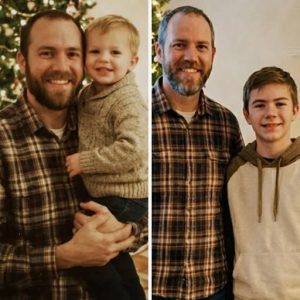Every Tuesday at 4 PM, a little girl shows up at the laundromat and leaps into the arms of an old man — a biker named Ray. The girl, about seven or eight years old, is small and wears an oversized coat; her eyes already carry old‑soul sadness. Ray is the kind of man people instinctively cross the street to avoid: leather vest patched up, scarred hands from decades wrenching on motorcycles, a beard that could hide a raccoon. Most children steer clear; but this girl, who Ray comes to call Destiny, runs straight to him as though he’s the only safe place around. Every week, without fail, she collapses into his lap and cries — crying so deeply that strangers stare, whisper, film. One woman even called the police, afraid Ray might be luring a child. The manager of the laundromat vouched for him. He knows what’s going on, but like everyone else, he can’t say a word — because if the truth comes out, they’ll take Destiny away from the only person she has left.
Ray first met Destiny three months prior. He’d ended a 300‑mile ride and decided to wash the dust and road grit off his clothes. As he sat by the dryers, Destiny entered the laundromat dragging a large trash bag — bigger than she was. It was stuffed full of clothes. She was alone. No adult with her. She tried to hoist the bag into a washer. She failed several times. On her third attempt, the bag toppled over, spilling clothes all over the floor — and she crumpled to the ground, tears streaming faster than she could wipe. Ray crouched beside her quietly and gave her a simple offer: “Need help, little one?” She whispered, “I’m a big girl — Mama said I can do it.” But she couldn’t. That’s when the sobs came, the kind no child should ever know. The clothes in the bag were not children’s clothes, but women’s, smelling of hospital bleach, disinfectant — the sour scent of sickness and pain.
When Ray gently asked where her mother was, Destiny said “in the car, she’s tired.” But scared children lie, and frightened ones lie worst of all. Ray kept quiet. He loaded the washer with the clothes, paid for the wash, and handed the child a granola bar from his saddlebag. She took it without a word, nodded, eyes wide. Then she begged him not to tell anyone she needed help. He obeyed. She returned the next Tuesday — same trash bag, same clothes, same fragile attempt at a smile. But this time, Ray saw bruises on her arms: not fresh finger‑mark bruises, but old shape bruises from sleeping on the cold floor or in a car, from hard nights and harder days. He asked, softly, “Is your mama really in the car?” She lip‑quivered, looked away, whispered, “Please don’t tell. They’ll take me away. Mama said if they find out, they’ll split us up.” And then the tears came again.
From those sobs, the truth poured out. Destiny’s mother was in a nearby homeless shelter — terminally ill with stage‑four breast cancer, too weak to walk, too weak to lift anything. They’d been evicted when she became too sick to work. Their home gone. Their dignity gone. Nights spent in a car, or on cots in a crowded shelter. The shelter had no laundry; the mother had no strength. So every week, Destiny trudged to the laundromat with that bag, dragging her mother’s clothes through the worst days and uncertain nights — doing what she could, for as long as she could. Her father had died in Afghanistan. Her grandmother had passed the previous winter. She had no one left — except her mother, and soon, not even her.
That Tuesday, as Destiny wept, Ray made a promise. “You’re not alone,” he said. “I’ll be here every Tuesday. Same time. You don’t do this by yourself anymore.” She looked at him, bewildered: “Why? You don’t even know me.” He pulled out an old photo — a faded image of a girl missing two front teeth, smiling. “That was my daughter, Sarah,” he said. “She died of leukemia when she was eight.” His voice cracked. “I couldn’t save her. But maybe I can help you.” From that moment on, Ray became Destiny’s protector. Every Tuesday he helped her with laundry, folded clothes alongside her. He’d slip bills into the clean clothes so her mother would never feel she had nothing left to give. He brought extra sandwiches, spare clothes, gloves and jackets that didn’t fit him anymore. Through small acts, Ray tried to give a child and a dying woman dignity, kindness, hope — miraculous kindness from a man judged by outer scars.
Fate dealt harder blows. There were Tuesdays when Destiny didn’t come. Ray waited — sometimes for hours — panic clawing at his chest the way grief once did when his daughter slipped away. Finally, after several weeks, Destiny returned — smaller, paler, hollow‑cheeked, swollen‑eyed. Her mother was in the hospital and “might not leave.” She was placed temporarily with a case‑worker — a stranger, some kind of official. Both Ray and Destiny knew what that meant: it meant “orphan.” They both understood — but only Ray had a plan. He confessed something he’d kept secret: last month, he’d obtained an emergency foster license. If something happened… Destiny wouldn’t have to go with strangers. She could come to live with him. The tears came again, but this time there was hope.
When her mother passed, Ray was there. He held Destiny while she said goodbye — and held her mother’s hand as she whispered her final thanks. In hours, the state approved Ray’s emergency custody request. Three days later, Destiny moved in. Ray’s apartment, once a lonely cave carved out for a solitary old biker, transformed overnight. His club brothers and their wives showed up with paint, toys, stuffed animals, and tools. They turned his drab spare room into a pink, twinkling, princess‑themed haven. Some nights, Destiny still woke crying — the trauma too big sometimes. But often now she laughed. She read books at the kitchen table. She did homework. She called him “Dad.” The first time she said it, Ray’s knees nearly buckled.
Even now, every Tuesday at 4 PM they return to the laundromat — not out of necessity but out of reverence. That laundromat is where their lives collided, where the chance meeting of a dying woman, a hurting child, and a lonely biker changed three lives forever. Ray still thanks fate — or whatever power watches over lost souls — for dropping the right person into his world when he was convinced he had nothing left to give. Adopting a seven‑year-old at seventy isn’t what people expect. But Destiny isn’t a burden. She’s a second chance carved out of loss and grief. She’s proof that sometimes salvation comes from the most obvious place — from a pair of scarred hands and a worn leather vest, offered without judgment. And as the legal process nears completion, Ray knows the truth: she already is his daughter — in soul, heart, and daily life.


